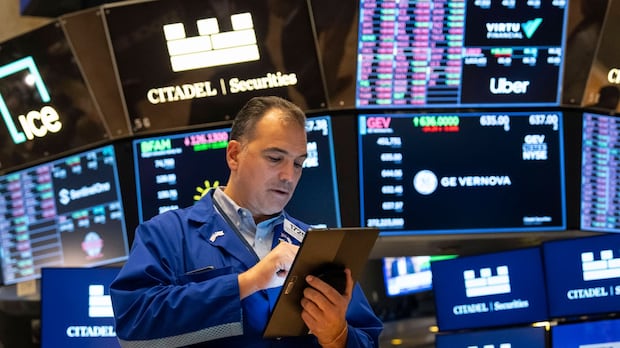
Stocks down in Canada, U.S., Europe as markets react to Trump's latest tariffs
Published: 2025-08-01 22:42:28 | Views: 15
The U.S. stock market had its worst day since May on Friday after the government reported a sharp slowdown in hiring and U.S. President Donald Trump imposed sweeping tariffs on imports from a number of trading partners.
The S&P 500 fell 1.6 per cent, its biggest decline since May 21 and its fourth straight loss. The index also posted a 2.4 per cent loss for the week, marking a sharp shift from last week's record-setting streak of gains.
The Dow Jones Industrial Average fell 1.2 per cent, while the Nasdaq Composite fell 2.2 per cent.
Canada's main stock index also lost ground on Friday, with the S&P/TSX Composite Index down nearly one per cent.
Worries on Wall Street about a weakening economy were heavily reinforced by the latest report on job growth in the U.S. Employers added just 73,000 jobs in July. That is sharply lower than economists expected. The U.S. Labour Department also reported that revisions shaved a stunning 258,000 jobs off May and June payrolls.
Markets also reacted to the latest tariff news. Trump announced new rates on dozens of countries and pushed back the scheduled effective date to Aug. 7, adding more uncertainty to the global trade picture.
"The market has been felled by a one-two punch of additional tariffs, as well as the weaker-than-expected employment data — not only for this month, but for the downward revisions to the prior months," said Sam Stovall, chief investment strategist at CFRA.
Trump's decision to order the immediate firing of the head of the government agency that produces the monthly jobs figures will only fuel the market's uncertainty, Stovall added.
Will a rate cut be coming?
The surprisingly weak hiring numbers led investors to step up their expectations for an interest rate cut in September. The market's odds of a quarter-point cut by the U.S. Federal Reserve rose to around 87 per cent from just under 40 per cent a day earlier, according to data from CME FedWatch.
The question now, Stovall said, is whether the Fed's policymakers consider a half-point cut next month, or even a quarter-point cut sometime before their next committee meeting.
The yield on the 10-year Treasury fell to 4.2 per cent from 4.4 per cent just before the hiring report was released. That's a big move for the bond market. The yield on the two-year Treasury, which more closely tracks expectations for Federal Reserve actions, plunged to 3.7 per cent from 3.9 per cent just prior to the report's release.

Businesses, investors and the Fed are all operating under a cloud of uncertainty from Trump's tariff policy. The latest moves give 66 countries, the European Union, Taiwan and the Falkland Islands another seven days, instead of taking effect on Friday, as Trump stated earlier.
Companies have been warning investors that the policy, with some tariffs already in effect while others change or get extended, has made it difficult to make forecasts. Walmart, Procter & Gamble and many others have warned about import taxes raising costs, eating into profits and raising prices for consumers.
Internet retail giant Amazon fell 8.3 per cent, despite reporting encouraging profit and sales for its most recent quarter. Technology behemoth Apple fell 2.5 per cent after also beating Wall Street's profit and revenue forecasts. Both companies face tougher operating conditions because of tariffs, with Apple forecasting a $1.1-billion US hit from the fees in the current quarter.
Exxon Mobil fell 1.8 per cent after reporting that profit dropped to the lowest level in four years, and sales fell as oil prices slumped as OPEC and OPEC allies ramped up production.
Outside of North America, stocks also fell across the world. Germany's DAX fell 2.7 per cent and France's CAC 40 fell 2.9 per cent. South Korea's Kospi tumbled 3.9 per cent
Source link







